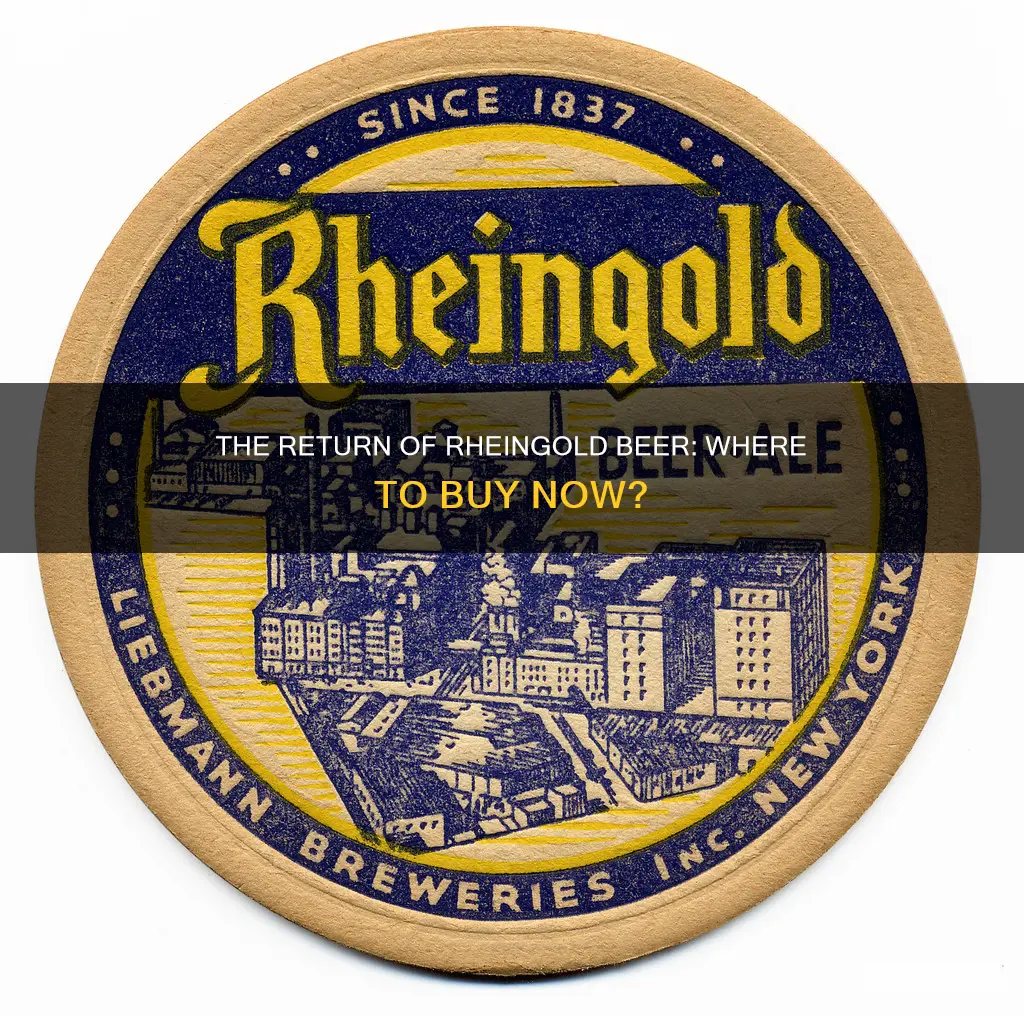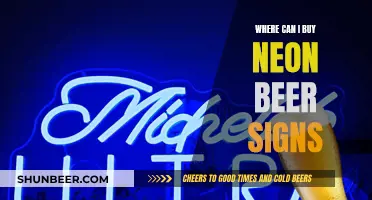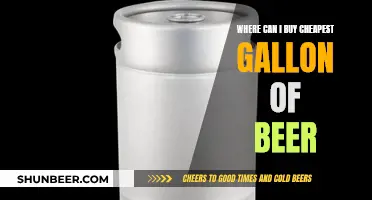
Rheingold Beer was produced and marketed by the Rheingold Brewery, also known as the Liebmann Breweries, from 1883 until 1987. The beer has been sold by other companies intermittently since then, with two gaps—one in the mid-1990s and another from 2013 through 2023. In 2024, Rheingold Brewing Co. was listed as being based in Connecticut, United States, and the beer was available in New York, Connecticut, New Jersey, Pennsylvania, and Maryland.
| Characteristics | Values |
|---|---|
| Can you still buy Rheingold beer? | Yes |
| Brewery | Rheingold Brewery, also referred to as Rheingold Breweries, or Liebmann Breweries |
| Year of foundation | 1883 |
| Year of closure | 1987 |
| Current producer | Brewing Brands, LLC |
| ABV | 5.0% |
| Calories | ~100 |
| Type | Pale Lager |
| Fermentation | Rheingold is krauesened (fermented twice) |
| Original gravity | 12.1 |
What You'll Learn

Rheingold Beer's current availability
Rheingold Beer is currently available for purchase, although its availability has been inconsistent over the years.
The original Rheingold Brewery, also known as Liebmann Breweries, produced and marketed Rheingold Beer from 1883 until 1987. After the brewery was ended, the brand was sold intermittently by other companies.
In 1996, Mike Mitaro, a beer industry veteran, licensed the rights to the Rheingold brand and relaunched the beer in 1998 under the Rheingold Brewing Company, Inc. The beer was produced under contract by F.X. Matt Brewing Company in Utica, New York, and later at Greenpoint Beer Works in Clinton Hill, Brooklyn.
However, the Rheingold brand changed hands several times in the following years, and its availability became inconsistent. In 2005, Drinks Americas of Wilton, Connecticut, purchased the Rheingold Brewing Company, Inc., and continued to produce the beer under contract with F.X. Matt Brewing Company. By 2011, Rheingold Beer was available in several states, including New York, Connecticut, New Jersey, Pennsylvania, Maryland, Ohio, Georgia, and Florida.
However, Drinks America stopped selling Rheingold in 2013, and it was unavailable until mid-2023 when Brewing Brands, LLC sold some. As of 2024, Rheingold Beer is still available for purchase, and distributors can be found in New York, Connecticut, and New Jersey.
Despite the changes in ownership and periods of unavailability, Rheingold Beer has maintained its traditional 1930s recipe and brewing process, including being krauesened, or fermented twice, which gives it its distinct dry smoothness.
Fat Tire Beer: PA Availability and Where to Buy
You may want to see also

The history of Rheingold Brewery
Rheingold Brewery, also known as Rheingold Breweries or Liebmann Breweries, was the producer and marketer of Rheingold Beer from 1883 until 1987. The company was founded by Samuel Liebmann and his three sons, Joseph, Henry and Charles, as S. Liebmann Brewery. By the time Samuel retired in 1868, the company had been renamed S. Liebmann's Sons Brewery. The Rheingold brand name was first used in 1883, and the beer was originally marketed as "Rheingold Extra Dry".
The Liebmann family ran the company until 1964, when the fourth American generation sold it to New Jersey-based Pepsi-Cola United Bottlers. At its peak, the company owned five plants across the United States and Rheingold was the leading beer brand in New York State, with a market share of 35% during the 1940s, 1950s, and early 1960s.
In 1964, the company was sold to Pepsi-Cola United Bottlers, and in 1967, Rheingold Breweries acquired Dawson Brewing Company in New Bedford, Massachusetts. In 1973, PepsiCo bought a controlling interest in Rheingold Breweries, but in 1974, after difficult negotiations with the local Teamsters Union, Pepsi closed the Brooklyn plant. The remaining two beer plants in Orange, New Jersey, and New Bedford, Massachusetts, remained open.
In 1974, William Black, the founder of the Chock full o'Nuts coffee company, stepped in and purchased the brewery. The Brooklyn plant was unprofitable and closed in 1976, with Rheingold production continuing in the brewery’s Orange, New Jersey, plant. In 1977, Chock full o'Nuts sold Rheingold Breweries to Christian Schmidt Brewing Company of Philadelphia, which moved production to its Philadelphia and Cleveland, Ohio, plants.
In 1987, Christian Schmidt's brands were sold to G. Heileman Brewing Company, which continued to manufacture Rheingold Beer in its La Crosse, Wisconsin, plant. In 1996, Mike Mitaro, a veteran beer industry executive, licensed the rights to the Rheingold brand, and the Rheingold Brewing Company, Inc. was relaunched in 1998. In 1999, the Rheingold brand was sold to Pabst Brewing Company, and in 2005, Drinks Americas of Wilton, Connecticut, purchased Rheingold Brewing Company, Inc.
The Rheingold Brewery building in Brooklyn was torn down in 1981, and in 2018, a 500-unit apartment building was built on the site.
Michigan's Non-Alcoholic Beer Buying Laws for Under 21s
You may want to see also

Rheingold's marketing campaigns
Rheingold Brewery, also known as Liebmann Breweries, was the producer and marketer of Rheingold Beer from 1883 to 1987. The company was founded by Samuel Liebmann and his three sons, and it was run by the Liebmann family until 1964. During Prohibition, from 1920 to 1933, the brewery survived by selling non-alcoholic products, including "near beer", lemonade, and "Teutonic", a concentrated liquid extract of malt and hops.
In the early 1940s, Rheingold developed a successful marketing formula that included radio and television jingles, the annual "Miss Rheingold" contest, official sponsorship of the New York Mets, and print and TV advertising with racial diversity that was atypical at the time. The "Miss Rheingold" contest was a citywide beauty pageant that was enormously popular in the 1950s and 1960s. The winner was selected by bar patrons across New York City each year, with more than 20 million ballots cast at its peak. Rheingold's radio and TV commercials typically featured jingles that became widely known, such as "My beer is Rheingold, the dry beer" and "Rheingold, the dry beer—think of Rheingold whenever you buy beer".
In the late 1960s and 1970s, the rise of national brewing powerhouses like Anheuser-Busch, Miller, and Coors pushed Rheingold and other local brands out of business. After a period of dormancy, Rheingold was reintroduced to the New York market in the late 1990s by a group of investors, including a member of the Liebman family. However, initial attempts to relaunch the beer were unsuccessful. It wasn't until 2002-2003 that the branding agency Powell of New York unveiled a guerrilla campaign that resonated with consumers.
The Rheingold beer campaign of the early 2000s targeted "downtown culture drivers," residents of Manhattan's Lower East Side and East Village, as well as Williamsburg, Brooklyn. These neighborhoods were known for their high concentration of self-consciously hip, creative young people. The campaign relied on word-of-mouth buzz, promotional events, and unconventional advertising strategies. For example, they placed cryptic billboards and fliers around the city that said, "Help! Have you seen this beer?" This generated a significant number of phone calls and media attention. The campaign was considered a success, with Rheingold spreading to 2,000 locations within a year and winning two Gold EFFIE Awards in 2004.
Buying Beer in Mexico: Sunday Shopping Laws Explained
You may want to see also

Rheingold's recipe and brewing process
Rheingold Beer is a pale lager with 5% ABV. It is brewed the same way it was 30 years ago, with no water added. It is fermented twice, using the slow, Old World technique of krauesening, which gives it its distinct dry smoothness. Rheingold has never lowered its original gravity, which is a measure of how robust or hearty a beer is.
The beer was originally produced by the Liebman Brewery of Brooklyn, New York, and enjoyed a successful few decades at the top of New York City's beer market in the mid-20th century. It was first introduced in 1883 by Joseph, Henry, and Charles Liebman, whose father, Samuel, a German immigrant, had established the brewery a generation earlier.
Rheingold's recipe changed from the dry style of the war years to its traditional 1930s style. It was known as Rheingold Beer from 2003.
The Liebmann Brewery was run by the Liebmann family from 1883 until 1964, when the fourth American generation sold it to New Jersey-based Pepsi-Cola United Bottlers. The brewery changed hands several times after that, and Rheingold was eventually purchased by G. Heileman Brewing Company in 1987, which continued to sell the beer. Sales of Rheingold have continued on and off by subsequent owners, with two gaps—one in the mid-1990s and another from 2013 through 2023.
Buying Beer in Horry County: Sunday Shopping Laws Explained
You may want to see also

Rheingold's popularity
Rheingold beer was the leading beer brand in New York State with a market share as high as 35% during the 1940s, 1950s, and early 1960s. The brand's advertising slogan "Rheingold Extra Dry" and radio jingle "Rheingold, the dry beer—think of Rheingold whenever you buy beer" became cultural touchstones for millions in the city.
The beer's popularity was also driven by its "Miss Rheingold" competition, an enormously popular, citywide beauty pageant staged in the 1950s and 1960s. At its peak in the 1950s and early 1960s, the promotional contest was decided by more than 20 million ballots, a number almost equal to the turnout of US presidential elections of the time.
Rheingold's core consumer was the working-class man. During the cleanup of the World Trade Center rubble after the 2001 collapse, Rheingold cans were found that had been stashed in the beams by construction workers decades earlier.
The rise of national brewing powerhouses like Anheuser-Busch, Miller, and Coors, however, pushed countless local brands, including Rheingold, out of business in the late 1960s and 1970s. Initial attempts to reintroduce the beer in the late 1990s were unsuccessful, but in 2002-2003, a guerrilla marketing campaign by the branding agency Powell of New York was considered an enormous success. Rheingold, initially available in only seven New York City bars, spread to 2,000 locations within a year.
Buying Beer in New Jersey: Grocery Store Guide
You may want to see also
Frequently asked questions
Yes, you can still buy Rheingold beer. It is available in New York, Connecticut, New Jersey, and other states.
You can find a list of distributors on the official Rheingold Beer website. Distributors are listed for New York, Connecticut, and New Jersey.
Rheingold is a pale lager with 5.0% ABV. It is brewed the same way it was 30 years ago and is packaged exactly as it is brewed, with no added water.
Rheingold beer was originally produced and marketed by the Rheingold Brewery, also known as the Liebmann Breweries, from 1883 until 1987. Since then, it has been sold by various companies intermittently. The current producer of Rheingold beer is unknown, but it was previously brewed by F.X. Matt Brewing Company in Utica, New York, and Greenpoint Beer Works in Clinton Hill, Brooklyn.







